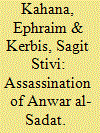|
|
|
Sort Order |
|
|
|
Items / Page
|
|
|
|
|
|
|
| Srl | Item |
| 1 |
ID:
130235


|
|
|
|
|
| Publication |
2014.
|
| Summary/Abstract |
Within the context of intelligence, the assassination of Egypt's President Muhammad Anwar al-Sadat on 6 October 1981 can be characterized as both a symbolic security failure and a failure to implement professional security principles by those responsible for guarding his life.
The circumstances creating the security "hole" were not confined to the short period preceding the assassination, but rather began long before, as part of an intense clash between two conflicting forces: extreme Islam and modern statehood.
In contrast to prevailing opinion, the apex of the struggle between these two forces is the main reason for the assassination, and not Sadat's peace with Israel. 1 The assassins of the al-Jihad group, springing unchecked from the substratum of fundamentalist Islam, carried out their work resolutely, exploiting the circumstances with almost incredible ease.
The sixth of October, observed in Egypt as a day of military triumph over the Israel Defense Forces (IDF) in the October 1973 War (the Yom Kippur War), is celebrated as an official holiday at the Grave of the Unknown Soldier on the outskirts of Cairo. On that date in 1981, on the reviewing stand stood President Sadat and his entourage: Vice President Hosni Mubarak; Defense Minister Mohammad Abu-Gazala; members of parliament; and members of the diplomatic corps, among them Israeli Ambassador Moshe Sassón.
Mirage fighter planes flew in celebratory formation above, and all in attendance were occupied with watching them and the huge parade passing before the reviewing stand, as columns of soldiers marched past the proud president.
When it was the artillery unit's turn to pass, a military truck stopped suddenly, from which four uniformed men sprang. Thinking this was part of the pageantry, no security personnel acted to prevent them from approaching the reviewing stand. One of the men quickly threw a grenade that did not explode, followed by more grenades. The assassins cocked their weapons and charged, firing at those on the reviewing stand.
The speed and suddenness with which the assassination was carried out resulted in pandemonium. People ran in all directions to take cover while Sadat stood, stiff and in shock, making him a clear target for sniper Hussein Abbas, 2 who shot him in the neck and chest. Sadat collapsed on the spot, yet this did not prevent another assassin, Abed al-Hamid, from emptying the rest of his rifle's magazine unhindered to confirm the kill. Sadat was flown by Gazelle helicopter to the Armed Forces Military Hospital at Ma'adi, but he arrived with no pulse, as his chest and arteries had been fatally penetrated.
The individual responsible for the assassination was Captain Khalid al-Islambouli. The fact that he and his partners managed to carry out this "inside job," despite explicit warnings having been received of threats on the president's life at the parade, testifies to a complete absence of common sense on the part of the Egyptian security sector.
The head of the Israeli security unit and lead investigator of the assassination, who was also responsible for Ambassador Sasson's rescue, was Avraham Rotem. According to Rotem, some members of Sadat's security detail were known to Rotem's unit personally due to previous reciprocal visits between Israeli and Egyptian personnel. 3 For this reason, the part played by Egyptian security personnel that day remains a mystery, due precisely to Israel's familiarity with them and the fact that they had acquired their security expertise from the best American instructional training. Sadat's assassination therefore raises a number of burning questions emanating from the fact that many in the upper Egyptian echelons knew that Sadat was in the opposition's crosshairs.
|
|
|
|
|
|
|
|
|
|
|
|
|
|
|
|
|
|
|
|
|